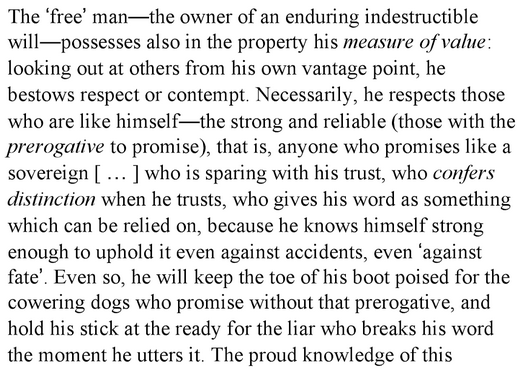The point at issue is whether GM is irony. There are reasons for regarding Also Sprach Zarathustra as political irony (Daniel W. Conway, 'Solving the Problem of Socrates: Nietzsche's Zarathustra as Political Irony', Political Theory, Vol. 16, No. 2 (May, 1988), 257-280.) Why not GM as moral irony ?
GM AS IRONY - FIRST ANGLE
I can cite only an extract here but there is an extended case for an ironic reading of GM in Robert Guay, 'Genealogy and Irony' :
GM is ironic: he tells us so. The first set of metatextual evidence comes
from GM ’s own preface, where Nietzsche reports that what he really cared about
“was something much more important than hypothesisizing [Hypothesenwesen]
about the origin of morality” ( GM P:5). This already gives us reason to suspect
irony: his discourse, which seems to consist of fussing over hypotheses
about the origin of morality, addresses something that he does not now, nor
has ever, actually cared about. The very enterprise is characterized derisively
with a funny-sounding neologism (Hypothesenwesen). And Nietzsche reinforces
this suspicion when he clarifies his real concern, “the problems of morality”
( GM P:7). These problems, says Nietzsche, are worth taking seriously, and
indeed more seriously than anything else, so that “some day one will perhaps
receive permission to take them cheerfully ” ( GM P:7). Treating this entire subject
matter as one worth inquiring into, in other words, is simply a necessary first
step to finding the whole matter risible. Hypothesisizing is possibly comic and
certainly instrumental rather than representational. This should not be surprising.
The subtitle of GM — another piece of metatextual evidence — is, after all,
“eine Streitschrift,” “a polemic,” and not, say, “a scientific account of moral
phenomena.” (Robert Guay, 'Genealogy and Irony', Journal of Nietzsche Studies, Vol. 41, No. 1 (Spring 2011), 26-49 : 32.)
GM AS IRONY - SECOND ANGLE
Readers must make up their own minds about the cogency of Guay's (extended) argument. I can only say that I find it hard not to read Nietzsche as genuinely recommending certain virtues and as dismissing those associated with the slave morality of Christianity.
Nietzsche and Socrates also share a common orientation to the task
of political education. Both view political education as an essentially
aretaic enterprise: they are primarily concerned not with the promotion
of correct behavior, but with the inculcation of virtuous states of
character. Just as Socrates promotes the just life as a political ideal, so
Nietzsche recommends certain virtues that he associates with his own
political ideal, the Übermensch*. Both Nietzsche and Socrates, how-
ever, acknowledge the indeterminancy of an aretaic program of political
education; as they both readily admit, a teacher of virtue wields no direct
control over the formation of his students' character. Whereas direct
discursive measures, such as the promulgation of rules, imperatives and
maxims, can certainly effect a change in behavior, they are largely
powerless to bring about the desired change in character. As a
consequence, virtue cannot be imparted to others via traditional
pedagogical means. Nietzsche would therefore endorse Socrates' appar-
ent conclusion in the Meno: If virtue could be taught, then why do
virtuous exemplars not abound?
The indeterminacy of an aretaic program of political education serves
to imbue the promotion of virtue with a certain irony. The promotion of
virtue has traditionally been deemed foolish-by critics ranging from
the earliest Cynics to contemporary maximizers of utility-for the
teacher of virtue must purposively engage himself, despite the fact that
his degree of success in this venture largely defies detection. Since the
teacher of virtue can only rarely verify his own success, the promotion of
virtue thus comprises a potentially interminable enterprise. The irony of
an aretaic program of political education therefore derives from the
unique demands it places on its agents. A teacher of virtue obviously
must take his task seriously, yet he cannot afford the luxury of also
taking himself seriously. If he were to fail in the former regard, then his
cynicism would discourage any prospective auditors; if he were to falter
in the latter, then the inevitably "unsatisfactory" progress of his auditors
would eventually frustrate his efforts. (Conway, 259.)
- The Übermensch is introduced in Zarathustra, not GM of course. But in both texts Nietzsche's focus is on authentic, life-enhancing traits of character. These, missing from GM's slave morality, are intrinsic to the character of Übermensch. In both works Nietzsche is a teacher of virtue : negatively against the spurious virtues of slave morality in GM and positively for the antithetical, genuine virtues of the Übermensch in Zarathustra.
If Conway is right there is an irony in the aretaic (from Gk arete = virtue) programme itself, as he explains in the second paragraph, not only in Zarathustra (his immediate subject) but also (though he does not mention it) in GM. Can Nietzsche, the eternally self-reflective, not have realised the irony in both cases ?
CONCLUSION
I am unconvinced by Guay's arguments; GM just doesn't read like irony. (Make up your own mind.) Conway's more oblique angle on Nietzsche's ironic engagement seems a more promising path to explore. But either way, we gain fresh light on the question (complex of questions) of Nietzsche's irony.

